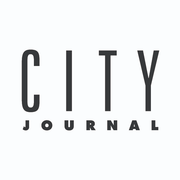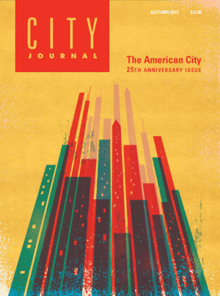City Journal
City Journal is a public policy magazine and website that covers a wide range of topics, from policing strategy, education reform, and social policy to urban architecture, family culture, and contemporary theories emanating from law schools, charitable foundations, and public health organizations. The magazine began publishing in 1990.[1][2][3]
 | |
 Cover of the 25th Anniversary Issue released in Autumn 2015. | |
| Editor | Brian C. Anderson |
|---|---|
| Categories | Urban policy, political science, culture |
| Frequency | Quarterly |
| Publisher | Manhattan Institute for Policy Research |
| Year founded | 1990[1] |
| First issue | Winter 1990 |
| Country | United States |
| Based in | New York City, New York |
| Website | www |
| ISSN | 1060-8540 |
| OCLC | 25172204 |
Publication
The magazine is published by the conservative Manhattan Institute for Policy Research[1][4] a national free-market think tank based in New York City. It was edited by Peter Salins and then Fred Siegel in the early 1990s. Myron Magnet, its editor from 1994 to 2006, is now editor-at-large. City Journal's current editor is Brian C. Anderson, who was appointed in late 2006 after serving as senior editor for ten years.[4] Contributors include experts like Senior Fellow Heather Mac Donald, Edward Glaeser, Steven Malanga, Nicole Gelinas, Kay Hymowitz, John Tierney, and Joel Kotkin. Though based in New York City, the magazine's scope is national and often international, through the contributions of writers such as Theodore Dalrymple, from Britain; Claire Berlinski and Guy Sorman from France; and Bruce Bawer in Norway.
The magazine was also noticeable as one of the first to link to blogs on its website that referenced it, and to engage directly with the blogosphere. City Journal has also published several special issues beginning in autumn 2009.[5] Subsequently, City Journal has put out special issues in autumn 2013,[6] summer 2016,[7] and spring 2017.[8] The 2009 and 2013 special issues were focused on policy agendas for New York State and City. In 2016, City Journal published a special issue on the state of Texas, called "Texas Rising",[7] and in 2017, City Journal considered the future of work and labor in an increasingly automated world, in an issue titled "The Shape of Work to Come".[8]
Website
All articles from the print magazine are eventually published online at City Journal's website, which also publishes original content (not from the magazine) daily, Mondays through Fridays. The first piece of new content for each week gets posted Sunday afternoon or evening. Original web pieces are generally shorter than the features in the print magazine, being typically about the length of an op-ed. They cover everything from public-policy issues and political developments to economics and popular culture.
The website also hosts City Journal's weekly podcast, 10 Blocks, which launched in February 2016.[9][10][11] 10 Blocks features discussions on urban policy and culture with host Brian C. Anderson and City Journal editors, contributors, and special guests.[9] Episodes cover topics such as: predictive policing; the Bronx renaissance; reform of the Port Authority of New York and New Jersey; homelessness in Portland, Oregon.
History
City Journal was founded in 1990 in response to New York City's crisis of governance, especially its high crime, amid broader anxieties about the future of American cities. City Journal has been called "arguably America's best magazine" by economist Thomas Sowell,[12] and "the great Fool Killer in the arena of urban policy" by novelist Tom Wolfe.[13]
The New York Post editorial board lauded it as "the magazine that helped save New York City".[3] Jay Nordlinger, writing in National Review, called City Journal "a beacon of civilization".[2] In 2016, City Journal ranked second in The Global Grid's "Top 20 Urban Planning Websites",[9] and again made the list in 2017, ranked fourth.[10]
Notable contributors
- Brian C. Anderson, editor of City Journal
- Steven Malanga, senior fellow and senior editor
- Claire Berlinski, contributor
- Theodore Dalrymple, contributing editor
- Edward Glaeser, senior fellow and contributing editor to City Journal
- Victor Davis Hanson, contributing editor
- Howard Husock, contributor
- Kay Hymowitz, senior fellow and contributing editor to City Journal
- Andrew Klavan, contributing editor
- Joel Kotkin, contributor
- John Leo, contributor
- Heather Mac Donald, senior fellow and contributing editor
- Myron Magnet, editor-at-large
- John O. McGinnis, contributor
- Judith Miller, adjunct fellow and contributing editor
- Lance Morrow, contributor
- Ian Penman, contributor
- Fred Siegel, senior fellow and contributing editor to City Journal
- Guy Sorman, contributing editor
- Harry Stein, contributing editor
- Sol Stern, adjunct fellow and contributing editor
- John Tierney, contributing editor
- Michael J. Totten, contributor
- John Stossel, video contributor
See also
References
- Friedersdorf, Conor. "Saving the City: An Interview With Brian Anderson". The Atlantic.
- Nordlinger, Jay (November 8, 2015). "A Beacon of Civilization". National Review.
- Post Editorial Board (November 13, 2015). "Happy 25th to City Journal — the magazine that helped save NYC". New York Post.
- "The Manhattan Institute celebrates City Journal's 20th anniversary". Manhattan Institute. 2014. Archived from the original on 7 July 2012. Retrieved 11 July 2015.
- City Journal Special Issue 2009.
- City Journal Special Issue 2013.
- City Journal Special Issue 2016.
- City Journal Special Issue 2017.
- Essbai, Sarah (December 1, 2016). "Top 20 Urban Planning Websites of 2016".
- Essbai, Sarah (October 18, 2017). "Top 20 Urban Planning Websites of 2017".
- "City Journal's 10 Blocks Podcast Goes Weekly". City Journal. May 11, 2018.
- "Thomas Sowell - Who Is 'Racist'?". Newsmagazine Network.
- Myron Magnet, The Millennial City: A New Urban Paradigm for 21st-century America (2000); William Allison Shimer, ed., The American Scholar, Vol. 69 (2000), p. 16.